[2007] 1 SLR(R) 629 - Singapore Law
[2007] 1 SLR(R) 629 - Singapore Law
[2007] 1 SLR(R) 629 - Singapore Law
Create successful ePaper yourself
Turn your PDF publications into a flip-book with our unique Google optimized e-Paper software.
662 SINGAPORE LAW REPORTS (REISSUE) [<strong>2007</strong>] 1 <strong>SLR</strong>(R)<br />
the same relief to assist foreign court proceedings. However, it is not clear<br />
from the grounds of decision in Karaha Bodas that this court had also<br />
endorsed this view, as on the facts before the court, this point also did not<br />
arise.<br />
69 In Front Carriers ([4] supra), Ang J took the view that she was not<br />
bound by Karaha Bodas, distinguishing it on the ground that there the<br />
court was not asked to grant a Mareva injunction to support a foreign<br />
arbitration (which had already been completed in Hong Kong), but the<br />
enforcement of the arbitration award (which was in the nature of court<br />
proceedings). On first impression, it would seem that the distinction cannot<br />
be supported in logic or in law. If the court has no power to grant a Mareva<br />
injunction to support foreign proceedings under s 4(10) of the CLA, a<br />
fortiori it could not do so in aid of foreign arbitration proceedings.<br />
However, a closer examination of the facts in Front Carriers shows that<br />
Ang J’s refusal to be bound by Karaha Bodas is justified by a critical<br />
difference of fact between the two cases (which we have earlier pointed out<br />
in [6] above). In Karaha Bodas, the plaintiff did not have an accrued cause<br />
of action against the defendant that was recognisable by a <strong>Singapore</strong> court.<br />
This is also the factual situation in the present case where Swift-Fortune<br />
also did not have an accrued action recognisable by a <strong>Singapore</strong> court. This<br />
factual difference would also explain Prakash J’s observation about the<br />
powerlessness of the court to grant a Mareva injunction under s 4(10) in the<br />
present case.<br />
70 In contrast, in Front Carriers, Ang J found as a fact that the plaintiff<br />
had an accrued cause of action against the defendant that was subject to the<br />
jurisdiction of the <strong>Singapore</strong> court. For this reason, Ang J was not wrong to<br />
distinguish Karaha Bodas on the ground that it was not concerned with a<br />
foreign arbitration. It was therefore open to her to interpret s 4(10) of the<br />
CLA in the light of the decision of the House of Lords in Channel Tunnel<br />
([47] supra). In that case, the accrued cause of action was justiciable in an<br />
English court but had been referred to arbitration in Brussels pursuant to<br />
the underlying contract. In other words, the material facts in both cases are<br />
similar. In Channel Tunnel, the House of Lords held that the English court<br />
had power under s 37(1) of the Supreme Court Act 1981 (c 54) (UK) (“the<br />
English 1981 Act”) (which corresponded to s 4(10) of the CLA) to grant<br />
Mareva interlocutory relief to assist a foreign arbitration so long as it<br />
retained some form of jurisdiction over the substantive claim. In a case<br />
where the parties have agreed to refer the substantive dispute to foreign<br />
arbitration, the retention of a residual jurisdiction would be sufficient to<br />
enable the court to exercise such power. It is on this basis that Ang J held<br />
that s 4(10) of the CLA, read with Art 9 of the Model <strong>Law</strong>, conferred a<br />
general power on the court to grant Mareva relief in support of foreign<br />
arbitration. We will come back to this issue later (at [86]).


![[2007] 1 SLR(R) 629 - Singapore Law](https://img.yumpu.com/7082457/34/500x640/2007-1-slrr-629-singapore-law.jpg)
![[2011] 1 SLR 727 - Singapore Law](https://img.yumpu.com/51140774/1/166x260/2011-1-slr-727-singapore-law.jpg?quality=85)
![[1983-1984] SLR(R) 447 - Artic Builders & Co - Singapore Law](https://img.yumpu.com/50909204/1/164x260/1983-1984-slrr-447-artic-builders-co-singapore-law.jpg?quality=85)
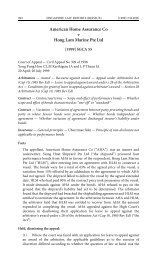
![[1996] 2 SLR(R) 292 - Lim Eng Hock Peter v ... - Singapore Law](https://img.yumpu.com/47482222/1/164x260/1996-2-slrr-292-lim-eng-hock-peter-v-singapore-law.jpg?quality=85)
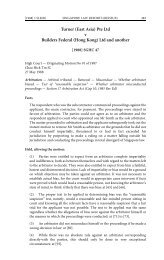
![[2006] 1 SLR(R) 197 - PT Asuransi Jasa Indonesia - Singapore Law](https://img.yumpu.com/46425352/1/164x260/2006-1-slrr-197-pt-asuransi-jasa-indonesia-singapore-law.jpg?quality=85)
![[1985-1986] SLR(R) 503 - Woh Hup (Pte) - Singapore Law](https://img.yumpu.com/45676364/1/164x260/1985-1986-slrr-503-woh-hup-pte-singapore-law.jpg?quality=85)
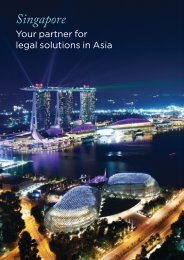
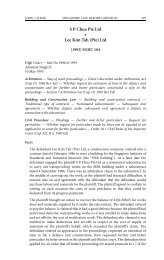
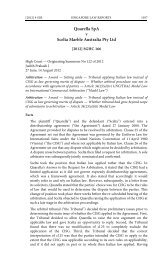
![[2010] 2 SLR 821 - Singapore Law](https://img.yumpu.com/43145563/1/166x260/2010-2-slr-821-singapore-law.jpg?quality=85)
![[2007] 1 SLR(R) 597 - PT Asuransi Jasa Indonesia - Singapore Law](https://img.yumpu.com/42983489/1/164x260/2007-1-slrr-597-pt-asuransi-jasa-indonesia-singapore-law.jpg?quality=85)
![[1989] 1 SLR(R) 433 - Singapore Law](https://img.yumpu.com/42649524/1/164x260/1989-1-slrr-433-singapore-law.jpg?quality=85)
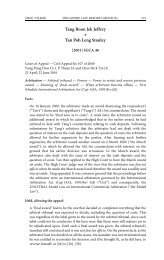
![[1997] 3 SLR(R) 360 - Singapore Law](https://img.yumpu.com/42287507/1/164x260/1997-3-slrr-360-singapore-law.jpg?quality=85)